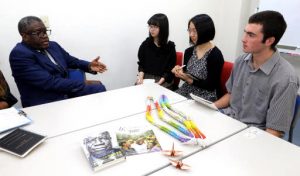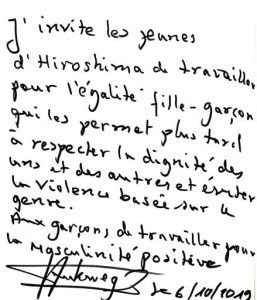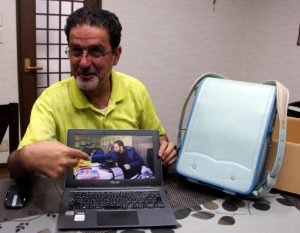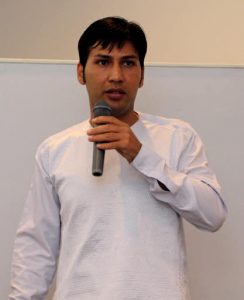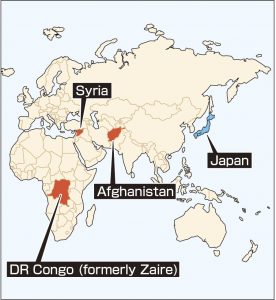Junior writers learn about conflicts in the world, shocked by sexual violence in DR Congo
Oct. 21, 2019
Many people around the world are driven from their homeland due to civil strife, even civil war, which involves military force. Such conflicts grow over confrontations between different ethnic groups or religions, or disputes between people who seek to monopolize their power. The junior writers of the Chugoku Shimbun interviewed Denis Mukwege, 64, a doctor from the central African nation of the Democratic Republic of Congo (DR Congo, formerly Zaire) who won the Nobel Peace Prize last year. We also listened to the stories of a former Afghan refugee and someone who has formed a group in Hiroshima Prefecture to support refugees. International conditions can be complex and difficult to understand, but we pondered this problem as an issue close to our own lives because it is usually children whose lives are stolen or are badly impacted by such conflicts.
Message from a Congolese doctor who won the Nobel Peace Prize: “Men and women are equal”
Denis Mukwege was awarded the Nobel Peace Prize in 2018 for his efforts to provide treatment and support to victims of sexual violence amid the armed conflict taking place in DR Congo. He was invited to Japan by non-governmental organizations in Tokyo and Hiroshima, and spoke in Hiroshima about the conditions in his country.
He explained that mineral resources that are vital in the making of electronic devices used by many of us, like smartphones, are being mined in DR Congo. Militia groups, in their efforts to control both the land and the people who live there, are involved in rampant sexual violence in these mineral-rich districts.
Mr. Mukwege began to focus on providing support for victims of rape when he realized that the same women were returning to his hospital, again and again, to have new wounds treated. Their daughters and granddaughters, too, were becoming victims of sexual violence. As a result, the dignity of these women is also harmed, and they are forced out of their villages. Others decide to leave their homes and flee to protect themselves from this violence. Consequently, the armed groups are able to expand the territory under their control. The situation has turned into a vicious circle.
The violations of human rights taking place in DR Congo are not widely known in the world. Mr. Mukwege made an appeal by saying, “Sexual violence is used as a low-cost weapon of control. Being indifferent to this reality becomes a destructive force in itself. This is a problem that involves us all and everyone should take action to address it.”
After speaking in Hiroshima, we asked Mr. Mukwege in an interview, “What can teenagers do to help stop these terrible things that are taking place in DR Congo?” He replied, “Sexual violence arises in an environment where gender equality does not exist. You must always hold in mind that men and woman are equal, not that ‘men are superior to women.’” He wrote this message on a large square we had prepared.
What Mr. Mukwege shared about the conditions in his country was completely new to us. We were so shocked by the information that we struggled to put it into words while writing this article.
Let us now turn to the conditions in areas that are experiencing conflict.
A citizens’ group in Hatsukaichi City sends relief supplies to Syria
One man has been working to send relief supplies from Hiroshima to Syria, where a harsh civil war continues to grow more complicated. Abdullah Basem, 51, is originally from Syria and now lives in Hatsukaichi City. In 2012, he formed a citizens’ group called “Japan Syria Solidarity Association,” which began its efforts to support Syrian refugees in 2013. Once a year Mr. Basem sends supplies gathered from all over Japan, including school backpacks and stationery, to children in refugee camps in Syria and Turkey, a neighboring country. The supplies are shipped from Kobe to Turkey, then trucked to the refugee camps by a local support group, which hand delivers the goods to children in need.
Mr. Basem’s face showed worry as he talked about the war, which has no end in sight. However, he said with conviction, “I’m not doing this just because Syria is my mother country. I want to help others in need, as a human being.”
We only have vague thoughts about wanting to help, but Mr. Basem has put his thoughts into form. We felt encouraged by his example, and will consider what we can do and take more concrete action.
A refugee for 11 years, he believes that Afghanistan will be revived
A “refugee” is a person who has been forced to leave their country in order to escape war or persecution. Wahidullah Hussainzada is a 30-year-old Afghan who was a refugee for 11 years. He spoke about his hardships during that period at an event in Hiroshima organized the Japan International Cooperation Agency Chugoku Center (JICA Chugoku).
Ten members of Mr. Hussainzada’s family, including his parents, fled to Iran in 1990, a neighboring country, just before the fighting of the Afghan civil war escalated. He was two years old at the time. The family abandoned their home and possessions, and managed to cross the border by staying hidden from the police.
In Iran, they faced poverty. Mr. Hussainzada had to support the family from an early age, working 12 hours a day at a machine where he sewed clothing. He said, “Sometimes we were attacked by local people who didn’t think much of refugees.”
After returning to his homeland at the age of 13, Mr. Hussainzada studied hard with an eye on becoming an adult who could support a brighter future for Afghanistan. He became a university lecturer and taught civil engineering. Last September, he came to Japan as a JICA trainee. Until March of 2021, he will study at the Hiroshima University Graduate School for International Development and Cooperation.
His goal is to educate young people who will work to help develop Afghanistan in the future. Although there is still a long way to go on the road to peace in that nation, he expressed a positive outlook by saying, “I believe that peace will come to my country, and Afghanistan will be rebuilt like Hiroshima, which was revived after the atomic bombing.”
This article was written by the following junior writers: Yukiho Saito, 17, Felix Walsh, 17, Miki Meguro, 16, Honoka Hiramatsu, 16, Yurina Yunoki, 15, Yuna Okajima, 14, and Yuno Nakashima, 13.
(Originally published on October 21, 2019)
Message from a Congolese doctor who won the Nobel Peace Prize: “Men and women are equal”
Denis Mukwege was awarded the Nobel Peace Prize in 2018 for his efforts to provide treatment and support to victims of sexual violence amid the armed conflict taking place in DR Congo. He was invited to Japan by non-governmental organizations in Tokyo and Hiroshima, and spoke in Hiroshima about the conditions in his country.
He explained that mineral resources that are vital in the making of electronic devices used by many of us, like smartphones, are being mined in DR Congo. Militia groups, in their efforts to control both the land and the people who live there, are involved in rampant sexual violence in these mineral-rich districts.
Mr. Mukwege began to focus on providing support for victims of rape when he realized that the same women were returning to his hospital, again and again, to have new wounds treated. Their daughters and granddaughters, too, were becoming victims of sexual violence. As a result, the dignity of these women is also harmed, and they are forced out of their villages. Others decide to leave their homes and flee to protect themselves from this violence. Consequently, the armed groups are able to expand the territory under their control. The situation has turned into a vicious circle.
The violations of human rights taking place in DR Congo are not widely known in the world. Mr. Mukwege made an appeal by saying, “Sexual violence is used as a low-cost weapon of control. Being indifferent to this reality becomes a destructive force in itself. This is a problem that involves us all and everyone should take action to address it.”
After speaking in Hiroshima, we asked Mr. Mukwege in an interview, “What can teenagers do to help stop these terrible things that are taking place in DR Congo?” He replied, “Sexual violence arises in an environment where gender equality does not exist. You must always hold in mind that men and woman are equal, not that ‘men are superior to women.’” He wrote this message on a large square we had prepared.
What Mr. Mukwege shared about the conditions in his country was completely new to us. We were so shocked by the information that we struggled to put it into words while writing this article.
Let us now turn to the conditions in areas that are experiencing conflict.
A citizens’ group in Hatsukaichi City sends relief supplies to Syria
One man has been working to send relief supplies from Hiroshima to Syria, where a harsh civil war continues to grow more complicated. Abdullah Basem, 51, is originally from Syria and now lives in Hatsukaichi City. In 2012, he formed a citizens’ group called “Japan Syria Solidarity Association,” which began its efforts to support Syrian refugees in 2013. Once a year Mr. Basem sends supplies gathered from all over Japan, including school backpacks and stationery, to children in refugee camps in Syria and Turkey, a neighboring country. The supplies are shipped from Kobe to Turkey, then trucked to the refugee camps by a local support group, which hand delivers the goods to children in need.
Mr. Basem’s face showed worry as he talked about the war, which has no end in sight. However, he said with conviction, “I’m not doing this just because Syria is my mother country. I want to help others in need, as a human being.”
We only have vague thoughts about wanting to help, but Mr. Basem has put his thoughts into form. We felt encouraged by his example, and will consider what we can do and take more concrete action.
A refugee for 11 years, he believes that Afghanistan will be revived
A “refugee” is a person who has been forced to leave their country in order to escape war or persecution. Wahidullah Hussainzada is a 30-year-old Afghan who was a refugee for 11 years. He spoke about his hardships during that period at an event in Hiroshima organized the Japan International Cooperation Agency Chugoku Center (JICA Chugoku).
Ten members of Mr. Hussainzada’s family, including his parents, fled to Iran in 1990, a neighboring country, just before the fighting of the Afghan civil war escalated. He was two years old at the time. The family abandoned their home and possessions, and managed to cross the border by staying hidden from the police.
In Iran, they faced poverty. Mr. Hussainzada had to support the family from an early age, working 12 hours a day at a machine where he sewed clothing. He said, “Sometimes we were attacked by local people who didn’t think much of refugees.”
After returning to his homeland at the age of 13, Mr. Hussainzada studied hard with an eye on becoming an adult who could support a brighter future for Afghanistan. He became a university lecturer and taught civil engineering. Last September, he came to Japan as a JICA trainee. Until March of 2021, he will study at the Hiroshima University Graduate School for International Development and Cooperation.
His goal is to educate young people who will work to help develop Afghanistan in the future. Although there is still a long way to go on the road to peace in that nation, he expressed a positive outlook by saying, “I believe that peace will come to my country, and Afghanistan will be rebuilt like Hiroshima, which was revived after the atomic bombing.”
This article was written by the following junior writers: Yukiho Saito, 17, Felix Walsh, 17, Miki Meguro, 16, Honoka Hiramatsu, 16, Yurina Yunoki, 15, Yuna Okajima, 14, and Yuno Nakashima, 13.
(Originally published on October 21, 2019)

